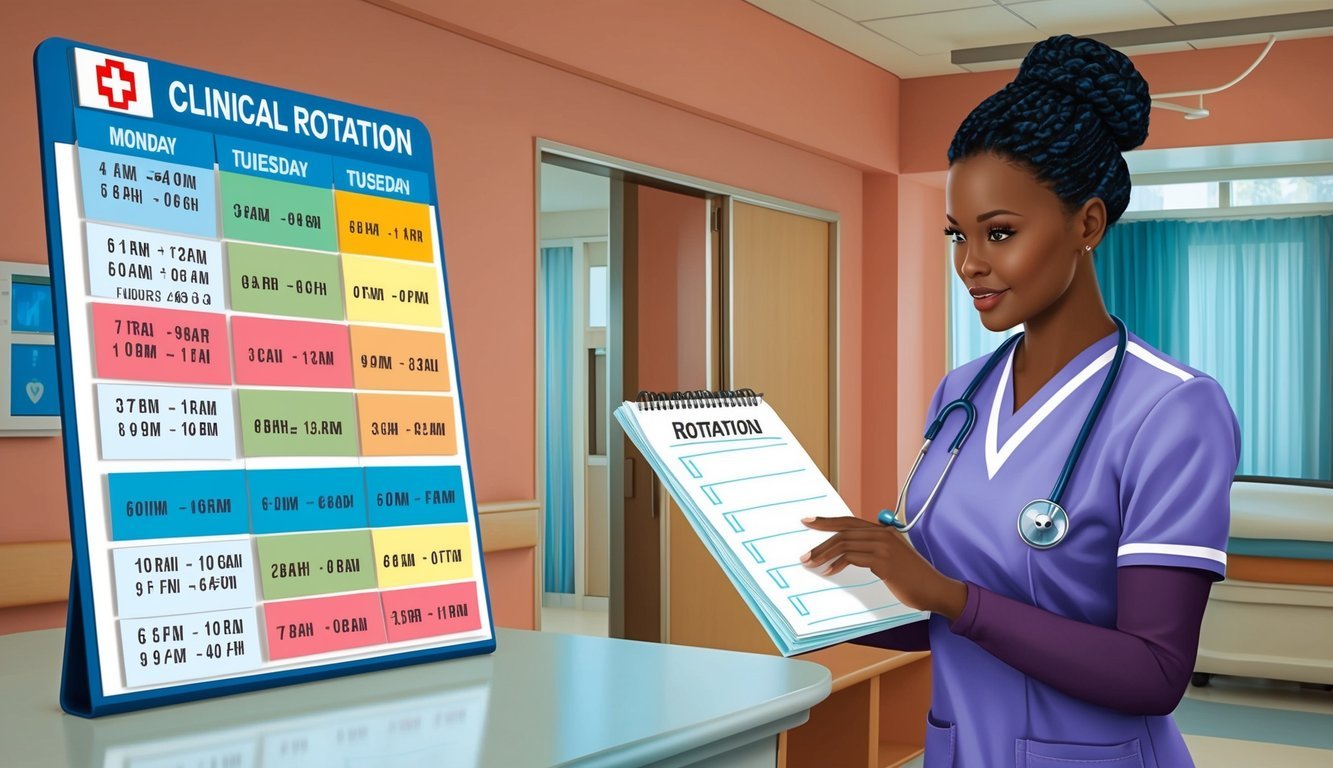As you prepare to take the NCLEX, you need to know the clinical hour requirements.
Typically, you need to complete 400 to 1,000 hours before you can register for the NCLEX.
The number of clinical hours you complete varies by state and type of nursing program.
This hands-on experience is essential for developing the skills and confidence you need to pass the exam and become a licensed nurse.
These clinical hours provide you with real-world experience, allowing you to apply what you’ve learned in school.
Completing the necessary clinical hours not only fulfills state requirements but also prepares you to face various situations you’ll encounter in your nursing career.
Knowing how many hours are required in your state can help you plan effectively and ensure you meet all necessary criteria for licensure.
Key Takeaways
- Clinical hour requirements for the NCLEX vary by state and program type.
- Hands-on experience is essential in preparing for the nursing profession.
- Meeting state requirements is crucial for successful licensure.
Understanding the NCLEX

The NCLEX is a critical exam for nursing licensure in the United States.
This section covers the two types of NCLEX exams, their components, and important updates regarding the Next Generation NCLEX (NGN).
Overview of NCLEX Exams
The NCLEX exams are designed to assess your nursing knowledge and skills.
The National Council of State Boards of Nursing (NCSBN) creates two main types of exams: the NCLEX-RN and the NCLEX-PN.
Before taking the exam, you need to complete a nursing program and meet your state’s requirements, including clinical hours.
Each state’s board may have unique rules you should check before registering.
Components of the NCLEX-RN and NCLEX-PN
Both the NCLEX-RN and NCLEX-PN have various components that test your understanding of nursing practices.
The key areas include:
- Safe and Effective Care Environment: This involves patient safety and infection control.
- Health Promotion and Maintenance: Focused on maintaining health and wellness.
- Psychosocial Integrity: Addressing patients’ mental health and emotional needs.
- Physiological Integrity: Covers basic care and comfort, pharmacological therapies, and more.
Understanding these components will help you prepare better for the exam.
The types of questions may include multiple-choice, fill-in-the-blank, and select-all-that-apply formats.
Next Generation NCLEX (NGN) Updates
The Next Generation NCLEX (NGN) is an updated version of the NCLEX exam set to launch in 2023.
It aims to better evaluate critical thinking and clinical judgment.
Key changes in the NGN include:
- Integrated scenarios: Questions that link clinical situations with nursing knowledge.
- Case studies: These will provide context for questions, requiring you to think critically.
Prepping for the NGN can involve using practice tests that mirror the NGN format.
Familiarize yourself with updates to ensure a thorough understanding of the new structure.
Clinical Hour Requirements

Understanding the clinical hour requirements is essential for your journey to becoming a licensed nurse.
These hours play a critical role in your education and preparation for the NCLEX exam.
Minimum Clinical Hours for Eligibility
To be eligible for the NCLEX exam, you must complete a specific number of clinical hours during your nursing program.
While requirements can vary by state and institution, many accredited nursing programs typically require students to complete between 500 to 1,000 clinical hours.
| Nursing Program Type | Minimum Clinical Hours Required |
|---|---|
| Associate Degree | 500 – 800 hours |
| Bachelor’s Degree | 800 – 1,000 hours |
| Master’s Degree | Varies by specialization |
These clinical hours often include direct patient care, allowing you to gain hands-on experience in real healthcare settings.
Check with your state’s board of nursing for specific requirements.
Role of Clinical Experience in Preparation
Clinical experience is significant in preparing you for the NCLEX and your nursing career.
This hands-on training helps you apply theoretical knowledge learned in class to real-life situations.
Experiences include working under supervision in hospitals, clinics, and other medical facilities.
During these hours, you can enhance skills like patient assessment, communication, and critical thinking.
Many nursing programs utilize simulation labs alongside clinical hours to ensure you are well-rounded in different aspects of patient care.
This combination builds your confidence and readiness for the NCLEX.
For detailed information on nursing regulations and requirements, you can visit the NCSBN.
Preparing for the NCLEX

Preparing for the NCLEX is essential to ensure you pass the exam on your first attempt.
A structured approach will help you to cover all necessary material and build confidence.
Focus on effective study plans, explore review courses, and understand the application process for authorization to test.
Effective Study Plans
Creating an NCLEX study plan is critical for your success.
Start by identifying key content areas you need to focus on.
Then, break your study time into manageable sections, which will help prevent burnout.
Consider the following tips:
- Set realistic goals: Aim for a certain number of study hours each week.
- Use varied resources: Incorporate textbooks, online practice questions, and videos.
- Practice regularly: Consistent practice with NCLEX-style questions helps you become familiar with the exam format.
You can also track your progress using a timeline or checklist to make adjustments as needed.
Review Courses and Test Prep
NCLEX review courses can provide structure and support during your preparation.
Many options are available, both in-person and online.
Key benefits of these courses include:
- Expert guidance: Instructors can clarify complex topics and offer tips.
- Structured learning: Courses often follow a set curriculum, ensuring comprehensive coverage.
- Practice tests: You’ll gain access to simulated NCLEX questions under timed conditions.
Consider reputable resources like Simple Nursing or local nursing schools for review options.
Applying for Authorization to Test
Before you can take the NCLEX, you must apply for authorization.
This process varies by state but generally follows these steps:
- Submit your application: Apply through your state’s nursing regulatory body.
- Pay the fee: Ensure you pay any required fees during this process.
- Receive authorization: Once your application is processed, you’ll receive an Authorization to Test (ATT).
Your ATT will include details on scheduling your exam.
Make sure to keep it safe, as you’ll need this document to register for the NCLEX.
Once you have this, you can move on to scheduling your test date with Pearson VUE.
Licensure Process and Requirements

Understanding the licensure process is essential for anyone pursuing a nursing career.
It involves navigating state regulations, fulfilling required qualifications, and passing necessary background checks.
Navigating State Board of Nursing Policies
Each state has its own Board of Nursing that governs licensure.
You need to familiarize yourself with your state’s specific policies, as they can vary significantly.
- Key components often include:
- Educational requirements: Usually an accredited nursing program.
- Clinical hours: Most states require a certain number of supervised clinical hours before you can take the NCLEX.
Ask your state board for a checklist to ensure all your requirements are met.
Visit NCSBN for detailed information about specific state regulations.
Meeting Licensure Prerequisites
Before obtaining your nursing license, you must complete several prerequisites.
These generally include:
- Educational Credentials: Obtain a nursing degree (ADN or BSN) from an accredited program.
- Clinical Training: Complete the required clinical hours to gain hands-on experience.
- NCLEX Exam: Successfully pass the NCLEX-RN or NCLEX-PN exam, depending on your intended practice.
Be prepared to provide proof of your educational achievements and clinical hours to the State Board of Nursing.
Check NurseJournal for state-specific requirements.
Handling Criminal Background Checks
Criminal background checks are a critical part of the licensure process.
Most state boards require you to submit to a background check, as this helps ensure patient safety.
- Key points to remember:
- You may need to disclose any past convictions.
- Certain offenses could affect your eligibility to obtain a nursing license.
Ensure you understand your state’s policies on background checks, as some boards have different criteria for what is acceptable.
It’s advisable to consult your state’s Board of Nursing for specific guidelines.
After Passing the NCLEX

Once you pass the NCLEX, you embark on a new journey in your nursing career.
Important steps include securing employment and pursuing continued education to advance your skills and knowledge.
Securing Nursing Employment
After passing the NCLEX, the first step is to secure a nursing position.
Many hospitals and healthcare facilities actively look for new RNs.
Networking can be key in this process.
Attend job fairs and local nursing events to connect with potential employers.
When applying, tailor your resume to highlight your education and any clinical hours you completed.
It’s crucial to demonstrate your hands-on experience during your nursing degree.
Keep in mind the NCLEX pass rate in your area, as hospitals may prioritize candidates from programs with higher rates.
Consider looking into specialty areas where you might be most interested, such as pediatrics or geriatrics.
Some of these specialties may require additional certification or training.
Continued Education and Professional Development
As a registered nurse, your education doesn’t stop after passing the NCLEX.
Many RNs choose to pursue an RN to BSN program to enhance their qualifications.
This additional degree can lead to better job opportunities and increased earning potential.
You should also stay current with industry trends and best practices by reading nursing publications and attending workshops.
Participating in continuing education (CE) courses is often required for license renewal in many states.
Take advantage of networking events and professional organizations to learn about new developments in nursing.
These resources can also provide valuable information about upcoming conferences and seminars that focus on various aspects of the nursing profession.
Frequently Asked Questions
When preparing for the NCLEX exam, many important points need your attention.
You should consider the clinical hour requirements, which can vary by state and program.
Understanding these specifics will help you be better prepared for your nursing career.
What are the clinical hour requirements for NCLEX licensure in the United States?
Most states require nursing students to complete a minimum of 75 to 100 clinical hours to qualify for the NCLEX exam.
This can include various hands-on experiences in healthcare settings.
The specific requirements can differ depending on your nursing program and state regulations.
What is the minimum number of clinical hours mandated for RN candidates in California?
In California, aspiring RNs must complete at least 1,000 clinical hours as part of their nursing education.
This includes both direct patient care and other clinical experiences that contribute to your training.
Are the clinical hour requisites standardized for all states, or do they vary for NCLEX qualification?
Clinical hour requirements are not standardized across all states.
Each state has its own regulations, which can lead to differences in how many hours are needed to sit for the NCLEX.
Always check the specific requirements for your state.
How do clinical hour requirements for nursing students compare across different states like Texas and Florida?
Texas requires a minimum of 400 clinical hours for RN candidates, while Florida mandates 77 hours of clinical practice.
This illustrates how states can have very different rules regarding the necessary clinical experience.
Is clinical experience essential for eligibility to take the NCLEX-RN examination?
Yes, clinical experience is essential for eligibility to take the NCLEX-RN examination.
Completing the required clinical hours is a key component of your nursing education and ensures that you have the practical skills necessary for safe patient care.
What is the recommended amount of study time for the NCLEX-RN in addition to clinical hours?
Experts recommend studying for at least 2-3 months before taking the NCLEX-RN exam.
This study time should complement the clinical hours you’ve completed.
It helps reinforce what you learned during your practical experiences.

